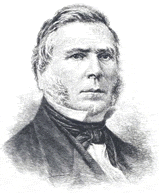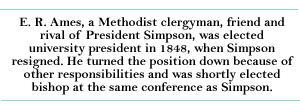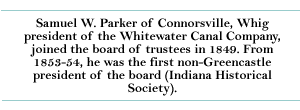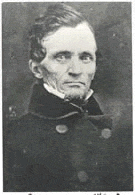
|
|
|
|
In
1848 President Simpson resigned to become editor of the Western
Christian Advocate in Cincinnati. His nine years of service, much
of it spent away from campus speaking to church and other groups
and making friends for the university like most modern college presidents,
were of crucial importance in getting Indiana Asbury established.
He was popular with the students and townspeople, perhaps more so
than any of his immediate successors. But his star was rising, and
he eventually went on to the Methodist espiscopacy and a major role
in American Protestantism. Preaching Lincoln's funeral elegy, Simpson
later had another Methodist college named after him, but he apparently
never lost his interest in Old Asbury. A
year passed in locating a new president. A prominent
Other
changes were affecting the control of Indiana Asbury University
at this time as well. In 1844 the Indiana Methodist Conference,
which was responsible for naming persons to the board of trustees
and visitors, was split in two, creating the new North Indiana Conference;
in 1852 and 1853 two more were formed, the Southeast and Northwest
Conferences. One result was the weakening of representation on the
board from Greencastle and Putnam County. As late as 1847, 15 out
of the 25 trustees were residents of Putnam County; by the '50s
the county's representation had dropped to three or four. No longer
dominated by a group of Greencastle professional men exercising
close personal supervision over the university's business, the board
was made up of men from all over the state who came together once
a year to review and give support to the president's program. In
1854 during the Berry crisis, it was headed for the first time by
a non-Greencastle man, Congressman Samuel W. Parker of Connorsville.
He was a Whig, originally from New York and president of the Whitewater
Canal Company. Town-gown unrest might also be accredited to this
loss of Greencastle influence. |
Depauw University e-history | E-mail comments to: archives@depauw.edu
|
People, Events & Traditions
|



